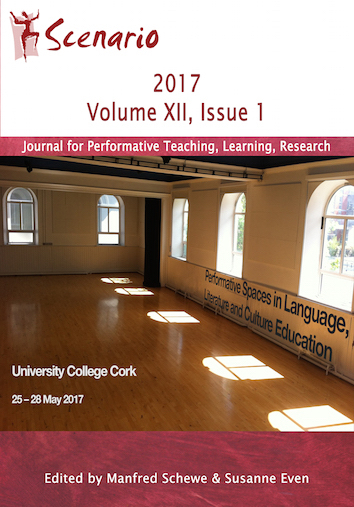Inhabiting SCOPUS: Navigating Modern Controversies with Performative Approaches in a Public Speaking Course
DOI:
https://doi.org/10.33178/scenario.11.1.6Abstract
COLL-P155 is an undergraduate public speaking course in which students give speeches on modern public controversies such as capital punishment, abortion, immigration, etc; in other words, issues for which many might hold a definite – at times inflexible – bias. In order to mitigate such biases, the concept of scopus, moving out of one perspective to inhabit another (Arthos, 2017a: Lecture 11), is situated in the goals of the speech assignments and combined with the theoretical and practical benefits of drama pedagogy as illustrated by Even (2008). Following a description of the speech assignments is a pedagogical reflection of activities that combine scopus and drama pedagogy to get students up and out of their seats in order to act out frames of mind that might embody perspectives drastically different from their own. From encouraging ad-hominem attacks in fictitious arguments about favorite foods to highlight the counterproductive and harmful nature of alienating language, to acting out a Grimm’s fairytale from the villain’s perspective to encourage empathy with an unpopular position, the lessons of open-mindedness and civility emphasized in these performative activities can be transferred to discourse surrounding real-world controversies.References
Arthos, John & Smith, Cynthia (2017): COLL-P155 Public Oral Communication Course Syllabus. College of Arts and Sciences, Indiana University-Bloomington. Microsoft Word file
Arthos, John (2017a): Lecture 11: Three Transformation Speeches. Public Oral Communication. Indiana University-Bloomington. April 12, 2017. Lecture
Arthos, John (2017b): Lecture 10: Speech of Transformation. Public Oral Communication. Indiana University-Bloomington. March 29, 2017. Lecture
Arthos, John (2017c): Lecture 3: Audience. Public Oral Communication. Indiana University-Bloomington. January 25, 2017. Lecture
Arthos, John (2017d): Lecture 1: Course Introduction. Public Oral Communication. Indiana University-Bloomington. January 11, 2017. Lecture
Bitzer, Lloyd (1968): The Rhetorical Situation. In: Philosophy and Rhetoric, Supplementary
Issue, 1992. University Park: Pennsylvania State University, 1-14
Even, Susanne (2008): Moving in(to) Imaginary Worlds: Drama Pedagogy for Foreign Language Teaching and Learning. In: Unterrichtspraxis Deutsch 41/2, 161-170
Foss, Sonja K. & Griffin, Cindy L. (1995): Beyond Persuasion: A Proposal for an Invitational Rhetoric. In: Communication Monographs 62/1, 2-18
James, William (1896): The Will to Believe. In: James, William: The Will to Believe and Other Essays in Popular Philosophy. New York: Dover Publications, Inc., 1-31
Kastely, James (2004): Pathos: Rhetoric and Emotion. In: Jost, Walter & Olmsted, Wendy (eds.): A Companion to Rhetoric and Rhetorical Criticism. Malden, MA: Blackwell, 221-237
Klofstad, Casey A.; Sokhey, Anand Edward & McClurg, Scott D. (2013): Disagreeing about Disagreement: How Conflict in Social Networks Affects Political Behavior. In: American Journal of Political Science 57/1, 120-134
Published
Issue
Section
License
Copyright (c) 2017 the author(s)

This work is licensed under a Creative Commons Attribution-NonCommercial-NoDerivatives 4.0 International License.







